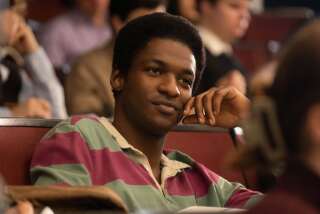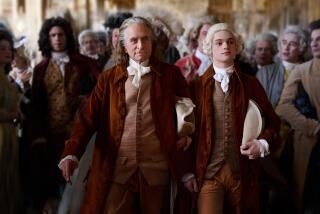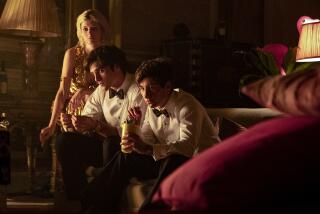‘The Fresh Prince’ fans, rejoice: ‘Bel-Air’ brilliantly reimagines a comedy classic
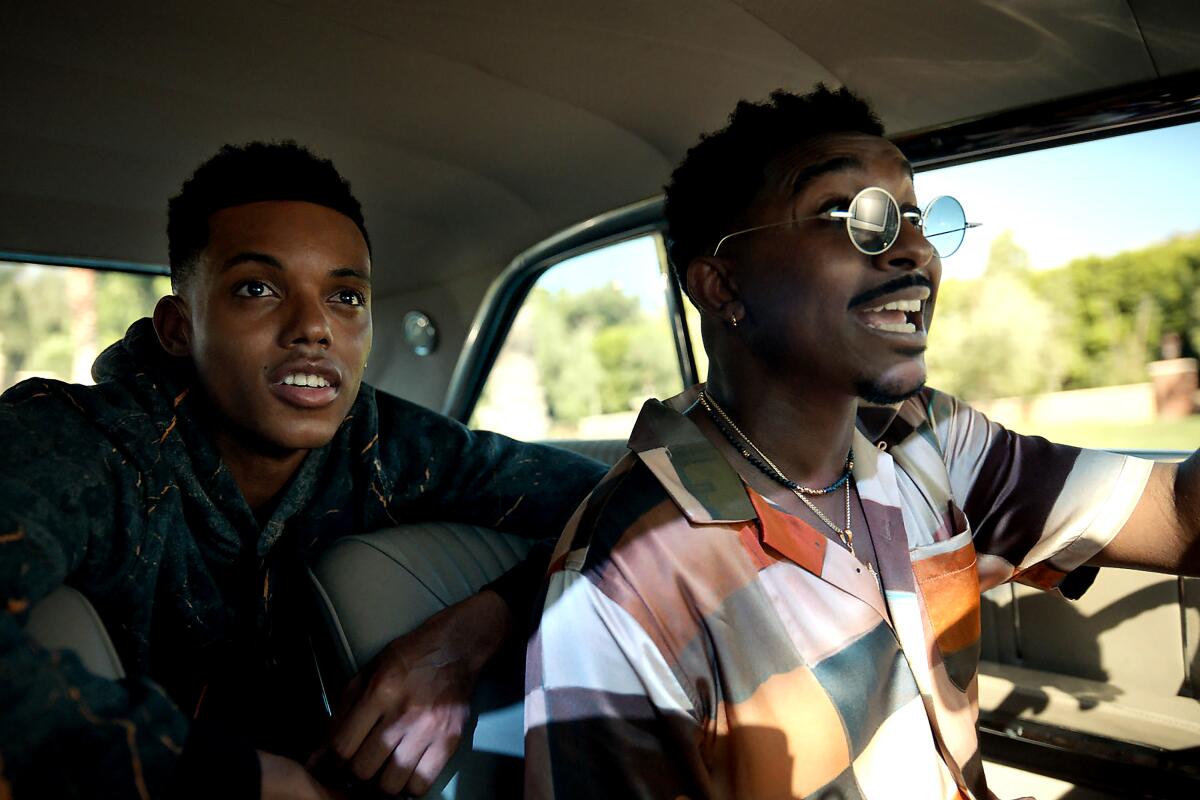
- Share via
Flipping pop culture on its head is a not-unpopular pastime: “Mary Poppins” envisioned as a horror film, “The Shining” with a laugh track, “Seinfeld” with the laugh track stripped out — there is a well of this stuff running deep into the internet. In 2019, Morgan Cooper, a Kansas City, Mo.-based filmmaker, went further, producing an original, contemporary, accomplished dramatic twist (in trailer form) on “The Fresh Prince of Bel-Air,” a sitcom that premiered around the time he was born. It was not a joke but a thought experiment — and ultimately, if “ultimately” can be used to describe something that happened 12 hours after the piece appeared on YouTube, a calling card. Will Smith‘s production company got in touch, and now we have “Bel-Air,” the impressive realization of that speculative trailer, premiering Sunday on Peacock.
The opening quarter of the pilot breaks out into drama the backstory “The Fresh Prince” encapsulated each week in its rapped opening credits. Jabari Banks plays Will Smith (originally played by Will Smith), a West Philadelphia teen who runs afoul of a local gangster on a basketball court. (This being a drama, something heavier than being spun around in the air by a bully is required; it also involves a gun, a trip to jail and a threat to his life.) Before Will knows it, literally, his mother (April Parker Jones) has packed his bag and is driving him to the airport, having arranged for him to stay with the Bankses in California, people he barely knows in a place that does not interest him (not being West Philadelphia, with its cheesesteaks and water ice).
Missing the car sent for him, Will falls in with Jazz (Jordan L. Jones, in the role originally played by DJ Jazzy Jeff Townes), in signature sunglasses, a colorful rogue ride-share driver (and, according to his card, a DJ) who delivers Will, by a strangely inefficient route, to Bel-Air and the Banks mansion, where nearly every room is big enough to house a house. (“You did not tell me that your family was white,” Jazz says. As dramatically unburdened comic relief, I hope to see a lot more of him.)
“It didn’t feel like a gamble to me,” creator Morgan Cooper says of the self-funded project, now a Peacock series. “That’s what we have to do as artists.”
Not every situation comedy would work equally well reimagined this way — “Gilligan’s Island,” you could refit as a Pirandello play, maybe, but it’s hard to imagine milking an ongoing drama out of that unlikely crew. (Then again, “Lost.”) But “The Fresh Prince” provides “Bel-Air” a solid foundation that manages at once to honor the original — and not just in the way that Will wears a ball cap sideways and his Academy jacket lining out — while taking it somewhere new; it’s more exploration than exploitation.
It helps that “The Fresh Prince” kept its focus on family, which we are told more than once here is the thing that really matters, and that family matters remain unchanged through the ages. Cultures will always clash. (“The Fresh Prince” is something of an artifact, yet it remains reliably funny and on point.) Socially and politically, on the other hand, the current climate demands of the premise something other than a lighthearted neon-colored comedy. “Bel-Air” goes all in on class difference, racial and economic privilege and distance traveled from one’s roots.
It helps too that the characters are not drawn as extremes — less so than in the situation comedy, in some cases — and that the drama, for all the confrontations these early episodes contain, stays shy of melodrama. There are instances where the writers’ desire to make a point is a little too plain — T.J. Brady and Rasheed Newson, whose shared credits include “The Chi,” “The 100” and “Army Wives,” are the showrunners — but for the most part character leads the way. These people will drive one another (and themselves) crazy, but none is evil, and all are easy to be around.
As characters in a serial drama, the Banks family will face challenges that can’t be framed between punchlines or resolved in half an hour. They are nearly all in flux, having, like their new mansion-mate, to figure out who they are. Aunt Viv (Cassandra Freeman), portrayed here as a once-rising artist, has put aside her paints and canvas to raise her children and support her husband; she teaches art at the university level, which ought to get some textual respect.
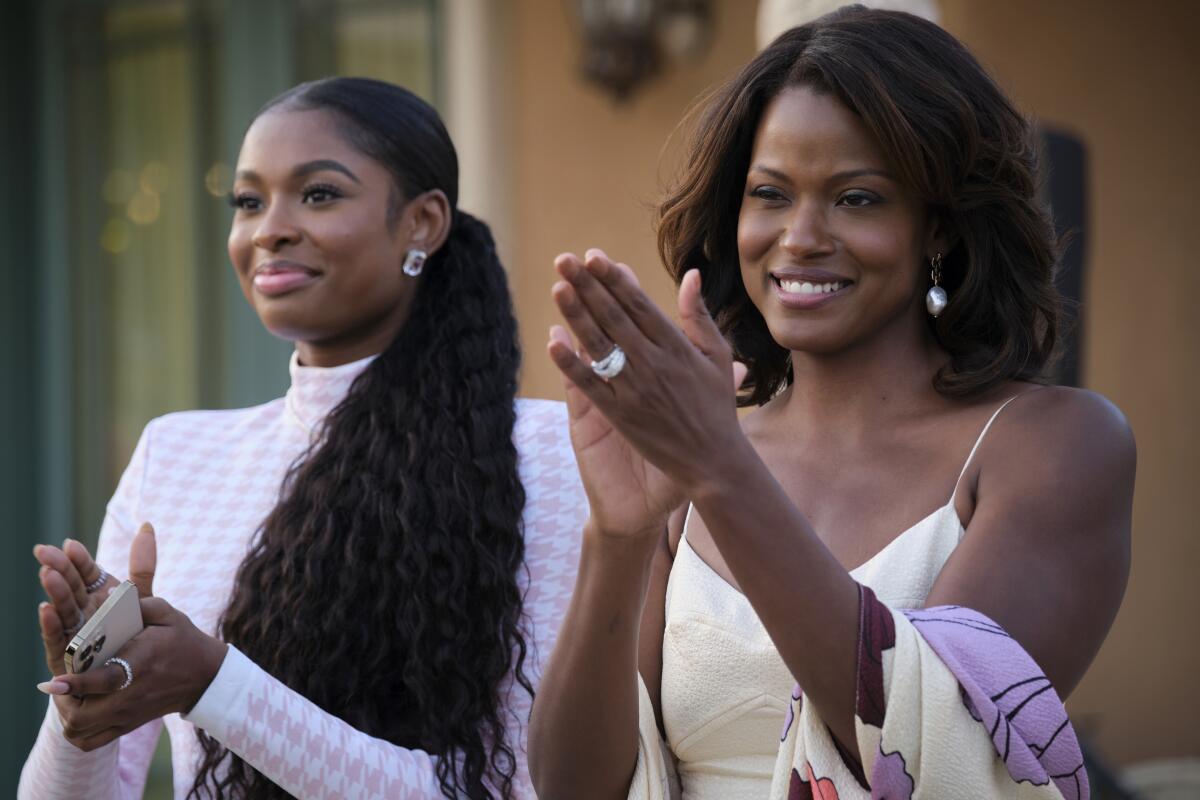
Uncle Phil (Adrian Holmes), still a successful lawyer, strict and not unwise, is running for district attorney, an echo of original Uncle Phil’s run for a judge’s seat; his memories of seeing A Tribe Called Quest “at the Civic Center with Biggie and Wu-Tang,” like his predecessor’s love of James Brown, suggest he can let his hair down — or could, if he had hair. He is stern with Will (“A real man takes the time to consider the consequences of his actions; a real man knows when to let go of his pride and make the most of a second chance”) and encouraging, giving him a copy of Paulo Coelho’s “The Alchemist,” “about a boy who finds the courage to follow his heart. In pursuit of his personal legend.”
Geoffrey (Jimmy Akingbola), immediately “G” to Will, is no longer a snooty butler but the “house manager,” Jamaican by way of London, who drinks (I’m going to say) Scotch and shoots pool with Phil. As is usually the way when the rich are portrayed on television by someone other than Julian Fellowes, the working class that keeps a mansion humming — housekeepers, cooks, gardeners (except when some D.H. Lawrence plot line may be afoot) — are, oddly here, invisible.
Among Will’s cousins, Hilary (Coco Jones) gets an aspirational upgrade, Carlton a bit of an emotional downgrade, and Ashley (Akira Akbar), after being allowed a line about “global warming and the polarized political climate in this country,” is essentially sent to her room with a pat on the head.
Hilary is still a bit of a material girl — a social media influencer, inevitably — but also an aspiring guru of food, something her sitcom predecessor only knew how to eat. Carlton (Olly Sholotan) is immediately conscious of Will’s capacity to steal a portion of his family’s attention — and that of his old girlfriend Lisa (Simone Joy Jones). Captain of the Bel-Air Academy lacrosse team (“I do kind of run the place,” he says of the very white school Will will attend), with his sights set on Princeton, he has something unstable in him, and his rivalry with Will is more aggressive, less passive, than in the sitcom of old. He’s still short, but that the drama spares us jokes on the subject is not the least of its good points.
Will Smith and Janet Hubert — Aunt Viv on “The Fresh Prince of Bel-Air” for three seasons — face each other for the first time in decades in HBO Max’s special.
There are no weak spots in the cast; everyone brings the right authority to the role. Most crucial of course is newcomer Banks, an excellent selection. He’s long and thin like Will Smith (the person), with the quality of still growing into himself, and while one might argue “Bel-Air” is its own show, and that shouldn’t matter, it does, given the identification of the player and the part. Otherwise, why not call the character Ed Jones and set the show in Southampton or Atherton? Sliding down a bannister or just walking into a room or flashing a smile, Banks projects light and high spirits, but he’s handy across the emotional spectrum, and as an actor, he’s a great listener; the camera will sometimes hang on his face while he’s being spoken to, just to watch him think. He looks good on a basketball court. And he’s from West Philly too.
Only three episodes (of the first season’s 10) were available for review, so it’s impossible to know how storylines will develop or be introduced over the longer term. (A second season was ordered at the time of the first.) Obviously there will be capital-D drama, and darkness, and possibly danger; hints to the last are introduced. And, as before, there will be lessons to learn. Sixteen-year-olds don’t know everything, and the “Fresh Prince” brand, running back to the music videos, has never been shy of self-deprecation, of not merely playing the fool but sometimes being one. (That “Bel-Air” is a basically teen-centric show that does not rob older generations of wisdom makes it feel satisfyingly old-fashioned.) Will is streetwise enough to have stayed out of trouble until the pilot episode, but there is an innocence about him, a naivete that makes his projected self-assurance palatable.
“I’m not a thug,” he’ll say, “I’m a smart-ass.” He’s a good kid, and as good kids have through the history of fiction, he also will have something to teach.
More to Read
The complete guide to home viewing
Get Screen Gab for everything about the TV shows and streaming movies everyone’s talking about.
You may occasionally receive promotional content from the Los Angeles Times.

